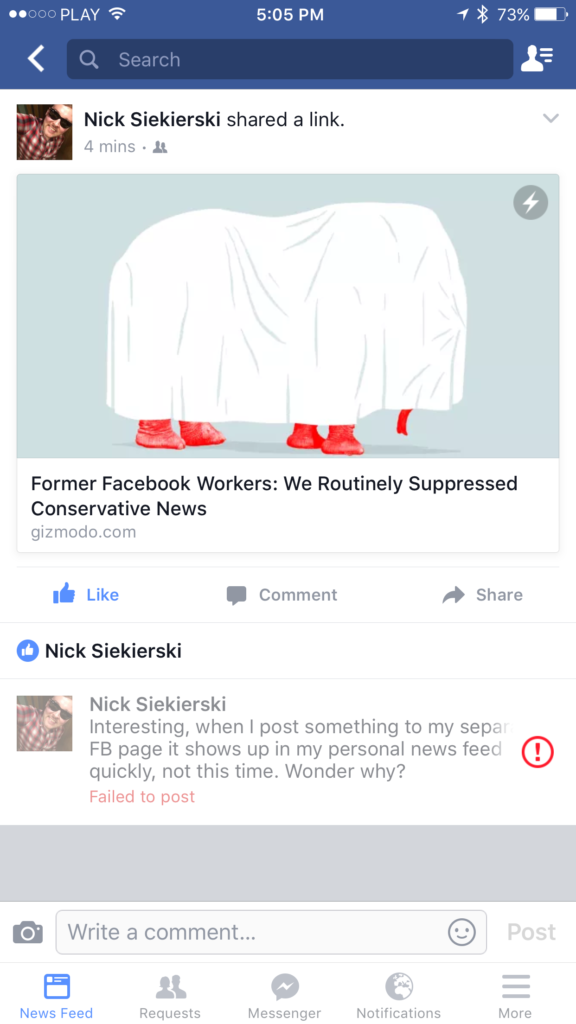
Last week
Gizmodo broke the story that Facebook actively censors conservative content in its trending news section.
According to several “news curators” who no longer work for the company, stories about conservative issues were prevented from appearing in the trending news section even if they were being shared among users. These curators also suppressed news stories about Facebook itself and “injected” other stories that weren’t being shared at all, such as those related to Black Lives Matter or Syria.
Stories reported by conservative outlets like Breitbart and the Washington Examiner were also excluded unless “mainstream” sources such as the New York Times or CNN also reported them.
Facebook has of course denied any wrongdoing.
When I tried sharing the story on Facebook, I received the error message below for the first time in my years using the service. I was able to post it on a repeated attempt, but it’s hard to believe it was a coincidence.

We already know that items that we post don’t all appear in the news feeds of our friends, Facebook’s algorithm determines this. It’s safe to assume that Facebook wouldn’t want this story to show up in volume in either the news feeds of friends, or the trending news section.
It’s the most negative news about Facebook in its history
I don’t believe that Facebook has a policy of suppressing conservative stories, but I do think this type of “curation” is a natural result of the politically correct (PC) culture that dominates there.
PC isn’t unique to Facebook, it’s broadly present throughout the
mass media and across many institutions in society.
In fact, a strong case can be made for PC being the dominant ideology of most of “the west” (America, Canada, Australia, Great Britain, etc.). This is actually the premise of
Thought Prison by Professor Bruce Charlton, an eye-opening book that I will review in the future.
The thought that Facebook stifles views because of a media-wide hive mind is even more terrifying than if it were official company policy.
Facebook CEO and founder, Mark Zuckerberg, has
scheduled a meeting with “conservatives” (I think Glen Beck is a nut and I’ve never heard of the others), to reassure them that what happened didn’t happen.
A
recent Guardian story about “Trending Review Guidelines”, demonstrates that Facebook’s internal policy of news curation is much more involved than users are led to believe. While it doesn’t reveal a
conscious bias, it confirms that algorithms and user sharing are not the dominant element in “trending news”.
News companies are increasingly reliant on Facebook for page views (nearly 1/3 of US adults read news through Facebook). This gives Facebook enormous power to determine what stories we are reading and to condition users over time through repeated exposure to certain topics and ideas (while simultaneously hiding or minimizing others).
Reactions from
Quartz and
Vox to these revelations are themselves illustrative of the PC mindset.
The news is presented as being mostly troubling to conservatives (though of course all of us have a vested interest in knowing when we’re being propagandized) and while Facebook’s practices aren’t lauded, we’re told that this is how we should have expected it to be all along.
Pandora’s Box has been opened on how the Mass Media operates and influences our lives.
I’ll be following this issue with interest, though I expect it to be buried and dropped down the memory hole by the mass media.
What’s important is that we learn from this episode and realize that the source of our news is just as important as the content itself. Facebook has greater power now than any media organization in human history. That power is being used (consciously or unconsciously) to promote an
ideology.
George Orwell’s 1984 presented a dystopian future where the government used mass surveillance to control its citizens.
The world we are living now may seem more benign than in that story, but it doesn’t mean that similar forces aren’t in play.
I don’t  it.
it.
 Last week Gizmodo broke the story that Facebook actively censors conservative content in its trending news section.
According to several “news curators” who no longer work for the company, stories about conservative issues were prevented from appearing in the trending news section even if they were being shared among users. These curators also suppressed news stories about Facebook itself and “injected” other stories that weren’t being shared at all, such as those related to Black Lives Matter or Syria.
Stories reported by conservative outlets like Breitbart and the Washington Examiner were also excluded unless “mainstream” sources such as the New York Times or CNN also reported them.
Last week Gizmodo broke the story that Facebook actively censors conservative content in its trending news section.
According to several “news curators” who no longer work for the company, stories about conservative issues were prevented from appearing in the trending news section even if they were being shared among users. These curators also suppressed news stories about Facebook itself and “injected” other stories that weren’t being shared at all, such as those related to Black Lives Matter or Syria.
Stories reported by conservative outlets like Breitbart and the Washington Examiner were also excluded unless “mainstream” sources such as the New York Times or CNN also reported them.
 We already know that items that we post don’t all appear in the news feeds of our friends, Facebook’s algorithm determines this. It’s safe to assume that Facebook wouldn’t want this story to show up in volume in either the news feeds of friends, or the trending news section.
We already know that items that we post don’t all appear in the news feeds of our friends, Facebook’s algorithm determines this. It’s safe to assume that Facebook wouldn’t want this story to show up in volume in either the news feeds of friends, or the trending news section.